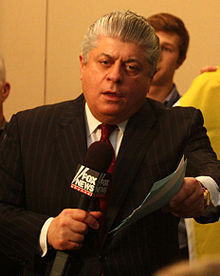
President Trump has been pushing Attorney General William Barr to make a public statement on the president's behalf
(Image by thelibertycaucus.com) Details DMCA
Throughout the House of Representatives' impeachment inquiry, President Trump has been pushing Attorney General William Barr to make a public statement on the president's behalf. He wants Barr to state publicly that even if the president did what congressional Democrats claim -- conditioning the release of $391 million in vital military and financial aid to Ukraine upon the announcement of a Ukrainian government investigation of former Vice President Joe Biden - such behavior did not constitute impeachable offenses.
The attorney general, to his credit, has declined to comply with the president's wishes. But he did stir the pot earlier this week with a partisan speech on the nature of the modern American presidency. That speech -- by its assertion that liberals have neutered the presidency or shackled it in chains -- must have been written in an alternate reality.
It is unseemly for the chief law enforcement officer in the land to make partisan attacks against ideological groups. This gives the impression that he is a political hack, not an impartial instigator and supervisor of criminal prosecutions.
However, there is something much larger here than Barr's attempts to placate his boss. Barr's impolitic speech was also a full-throated defense of the imperial presidency, no matter which party occupies the White House.
The Constitution was written to establish and to constrain the federal government. James Madison gave us a limited federal government and a presidency that was limited to enforcing the laws Congress enacted. This limited central government is the Madisonian model -- the feds may only do that which the Constitution expressly or impliedly authorizes.
When Woodrow Wilson came to the presidency, he had new ideas about the nature of the federal government. And he succeeded in imposing those ideas on the executive branch he headed and on the Congress whose appetitive for more power he whetted.
Wilson turned a modest constitutional presidency on its head. He argued, for example, that because the First Amendment prohibits Congress from infringing upon the freedom of speech, it imposed no such restraints on the presidency. That was his justification for dispatching a federal police force he created on his own -- which would later become the FBI -- to arrest young men for singing German beer hall songs in bars and taverns during World War I and for reading aloud the Declaration of Independence near the entrances to draft registration facilities.
Wilson also argued that the concept of the president as "head of state" gave him powers not articulated in the Constitution -- powers inherent in foreign heads of state. From this he crafted the Wilsonian model -- the feds can do whatever draws political support, except that which the Constitution expressly prohibits.
All post-Wilson presidents have followed his model, and this is where Attorney General Barr misses his mark. Madison predicted that the most feared branch of the new government -- the one that could get away with the most lawlessness, the one whose power would expand at the expense of the other two -- would be the presidency.
He was right.
Franklin D. Roosevelt closed banks and seized gold. Harry Truman unleashed domestic spies on Americans and killed and wounded hundreds of thousands of innocent Japanese civilians at Hiroshima and Nagasaki. Dwight Eisenhower ratcheted up domestic spying. Lyndon B. Johnson fought an illegal war by duping Congress into funding it. Richard Nixon spied on folks who exercised free speech that was critical of him and bombed Cambodia without any congressional authorization.
George H.W. Bush fought undeclared wars in Panama and Iraq and sent troops to kidnap a foreign head of state. Bill Clinton raised taxes retroactively and bombed an aspirin factory in Kosovo to divert American attention from his disastrous televised interrogation before a federal grand jury. George W. Bush authorized foreign torture and massive domestic spying. Barack Obama declared war on Libya and rewrote immigration laws that Congress rejected. President Trump has imposed a sales tax that he calls a tariff, bombed Syria without congressional consent, defied federal court orders at the border and spent money from the federal treasury not appropriated by Congress.
All of these presidential misdeeds were without constitutional authority and without sanction. Stated differently, they got away with it. Except in Nixon's case, not Congress, not the courts, and not the American public interfered. In fact, they looked the other way as the imperial presidency grew.
The common historical theme in all this is the willingness of Congress and the American public to accept claims of temporary safety over the loss of personal liberty.
The presidencies of George W. Bush and Barack Obama are particularly instructive. A Republican Congress gave Bush the power to force computer service providers and telecoms to work as federal spies against their will. And a Democratic Congress gave Obama the power to regulate the personal delivery of health care in private settings.
(Note: You can view every article as one long page if you sign up as an Advocate Member, or higher).





